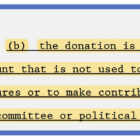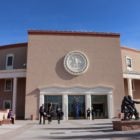Money in Politics
House kills effort to increase campaign sunshine and prevent corruption
|
The New Mexico House of Representatives rejected a package of reforms to the state’s Campaign Reporting Act that would have closed a loophole allowing independent groups to evade reporting their donors.
Senate Bill 42, sponsored by Senate Majority Leader Peter Wirth, D-Santa Fe, Sen. Katy Duhigg, D-Albuquerque, and Rep. Matthew McQueen, D-Galisteo, would have fixed language in the law that a nonprofit organization exploited in 2020 to get around disclosing who gave hundreds of thousands of dollars to pay for political advertising in support of a ballot referendum on converting the Public Regulation Commission from an elected to an appointed body.
Eleven Democrats joined all Republicans to kill the bill.
Eleven House Democrats joined all Republicans to defeat Senate Bill 42 on March 15, 2023. Image from the House of Representatives vote tally board. “I’m very disappointed that members of my own party joined all of the Republicans to prevent the public from knowing who is paying for, among other things, political attack ads,” McQueen said after the vote.
Other reforms in the package included changes to ensure candidates don’t charge interest on personal loans they make to their own campaign accounts, thereby profiting from campaign contributions used to pay off such loans.
It would have changed reporting dates to provide more timely information about contributors to their campaigns. Currently, the public is in the dark for months about who gives money to campaigns on election day, or in the months preceding the legislative session in non-election years.
The bill also would have barred lawmakers from accepting contributions from lobbyists or political committees during the legislative session.
During the floor debate on the bill, McQueen fielded a wide range of questions, many of them about existing provisions under the Campaign Reporting Act that wouldn’t have been changed under Senate Bill 42. Numerous questions were fielded about provisions related to personal loans made by candidates to their own campaign accounts.








